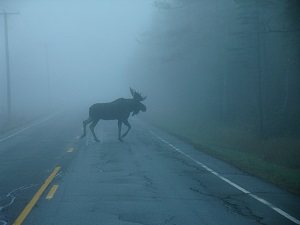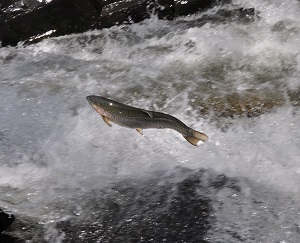Be Alert to Avoid Moose on the Highway
Drivers need to be
alert and cautious because moose are on the move, according to the Vermont Fish
& Wildlife Department. Moose are more likely to be crossing
roadways at this time of year, especially after dark or early in the morning as
they move from wintering areas to spring feeding locations.
More moose are hit
by motorists in the spring than at any other time of the year. There is
another peak of activity in September and October, the breeding season for
moose.
Moose are a threat
to motorists, but there are measures you can take to avoid hitting them,
according to Fish & Wildlife:
Always be aware of
the danger -- moose cross the road randomly, as well as at their regular
crossings.
Increase your
roadside awareness and reduce your speed when you see MOOSE CROSSING signs
along the highway. When on secondary roads, the recommended speed is 40
mph or less in these moose crossing areas.
Drive defensively
and don't overdrive your headlights. Moose are more active at night and
early morning, and they are difficult to see because of their dark color.
If you see a moose
ahead, slow down or stop. Trying to speed past them before they can move
can be a serious mistake.
Vermont highway
sections most frequented by moose:
-Rt.105 from Island Pond to Bloomfield.
-Rt.114 from East Burke to Canaan.
-Rt.2 from Lunenberg to East St. Johnsbury.
-Interstate 91 at Sheffield Heights.
-Interstate 89 from Bolton to Montpelier.
-Rt. 12 from Worcester to Elmore.
-Rt 118 near Belvidere Corners and the Rt. 109 intersection.
-Rt.105 from Island Pond to Bloomfield.
-Rt.114 from East Burke to Canaan.
-Rt.2 from Lunenberg to East St. Johnsbury.
-Interstate 91 at Sheffield Heights.
-Interstate 89 from Bolton to Montpelier.
-Rt. 12 from Worcester to Elmore.
-Rt 118 near Belvidere Corners and the Rt. 109 intersection.
Nineteen people
have died in motor vehicle collisions with moose on Vermont highways since
1985.
VTF&W
photo by Benjamin Young
VT
Fish &Wildlife cautions drivers that moose are more likely to be crossing
roadways at this time of year, especially after dark or early in the morning as
they move from wintering areas to spring feeding locations.
For
Immediate Release: April 24, 2018
Media Contact: Commissioner Louis Porter 802-828-1454
Col.
Jason Batchelder or Maj. George Scribner; 802-828-1529; Wildlife Biologist
Cedric Alexander 802-751-0105 Media Contact: Commissioner Louis Porter 802-828-1454



